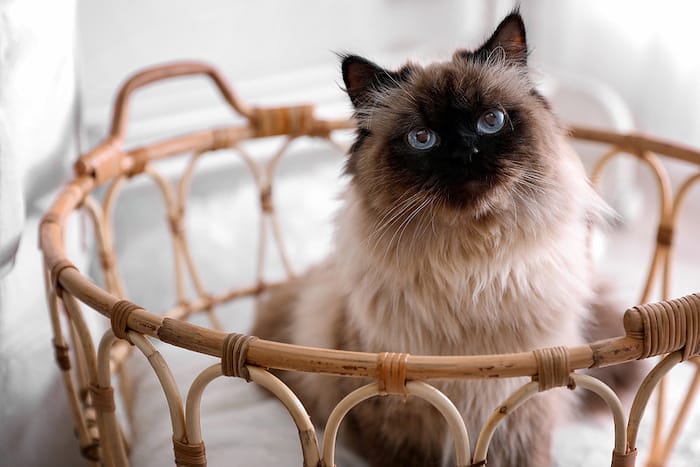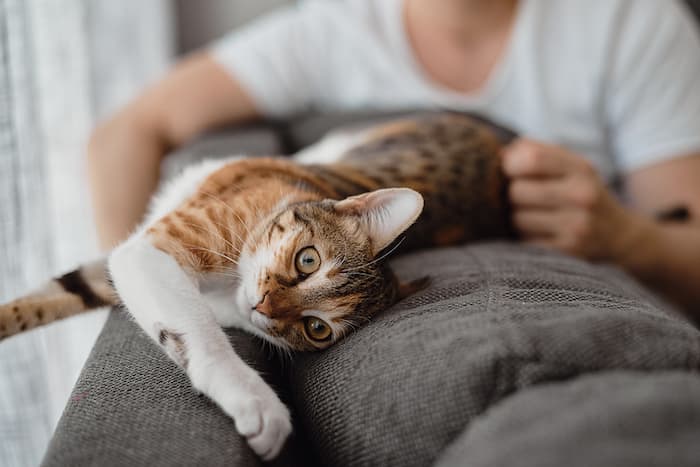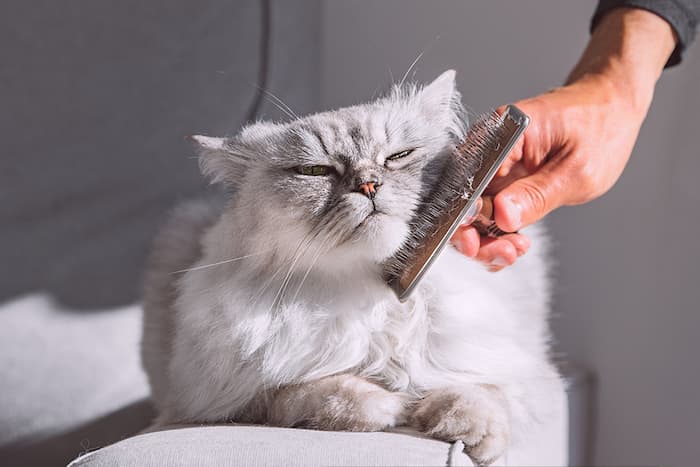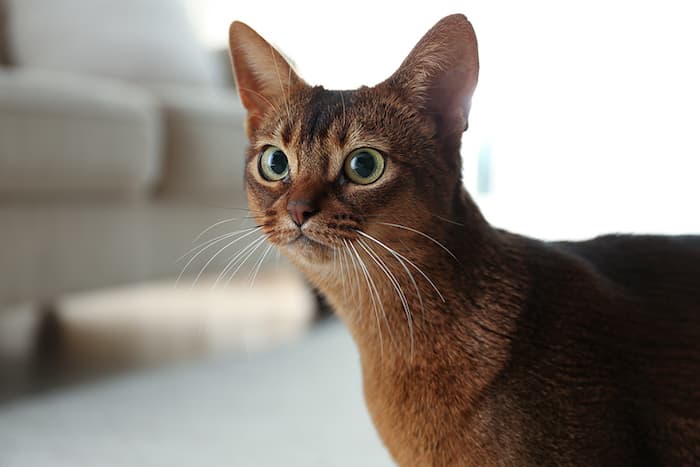Just like us, our furry companions sneeze for a variety of reasons. A cat may sneeze to clear their nasal passage of irritants like dust or pollen. It could also be an innocent response to a new fragrance in your home. But if your cat’s sneezing persists or is accompanied by other symptoms like discharge from the eyes or nose, it could be a sign of something more serious.
The causes of sneezing in cats range from simple triggers like a ticklish nose to more complex issues such as allergies, respiratory infections, or even dental diseases. And when you hear your cat sneeze, it’s important to note that persistent or excessive sneezing may require a visit to the vet.
In this article, we’ll delve into the various causes of sneezing in cats, how to distinguish between a harmless sneeze and a cause for concern, and what you can do to help your cat if they are sneezing a lot.

Common Causes of Sneezing in Cats
Let’s begin by delving into what might cause sneezing in your cat. We often see cats as mysterious creatures, their behaviors intriguing and sometimes puzzling. But when it comes to sneezing, cats aren’t so different from us humans.
Dust, Pollen, Fur, and Other Common Triggers
Just as we sometimes sneeze when dust or pollen tickles our nose, cats can also react similarly. The nasal passage of a cat is designed to trap and eliminate any foreign particles. When your cat inhales dust or pollen, it may trigger a sneeze to clear out these irritants. Even your cat’s fur, when groomed and inhaled, can be the culprit causing the sneezing.
Noxious Smells
Noxious smells from household chemicals or fragrant substances, like perfumes, can also make your cat sneeze. Cats have a keen sense of smell, and certain strong odors can be an irritant, causing them to sneeze as a defensive response. If you find your cat sneezing a lot after using a new cleaning product, it might be the smell that’s bothering their sensitive nose.
Airborne Particles
Airborne particles such as smoke, perfumes, or even mold spores can cause a cat to sneeze. If you’ve recently noticed your cat sneezing when you’re using a fragrant candle or when there’s smoke from cooking, airborne particles may be the cause of the sneezing.
Foreign Objects
You may wonder, what could possibly enter a cat’s nose that’s worth sneezing about? You’d be surprised. A piece of lint, a grass seed, or even a small bug can find its way into your cat’s nasal passage. The sneeze acts as a natural response to get rid of these foreign objects.
Respiratory Infections
In some cases, a sneezing cat might be suffering from a respiratory infection. The common cause of sneezing linked with infections can be a virus, such as the feline herpesvirus or calicivirus, bacterial, or even a fungal infection. If your cat is experiencing symptoms like coughing, wheezing, excessive nasal discharge, or if the sneezing is a lot more frequent than usual, it might be due to an upper respiratory infection.
Inflammation
Inflammation of the nasal cavity or sinuses, known as rhinitis or sinusitis, is another common cause of sneezing in cats. It can occur due to various reasons, including viral or bacterial infections or even allergies. The inflammation can cause your cat’s nose to become irritated and may lead to continuous sneezing.
Cat Allergies
Yes, cats may also have allergies too! And just like in humans, sneezing is a common symptom of these allergies in cats. The culprits can be the same as those that affect people – pollen, dust mites, certain foods, or even mold. If your cat starts sneezing during a particular season or after a diet change, allergies might be at play.
Dental Disease
Dental disease might not be the first thing that comes to mind when your cat sneezes. However, dental problems can sometimes cause drainage into the sinuses, leading to irritation and may also cause sneezing. If your cat’s sneezing is accompanied by loss of appetite or signs of discomfort while eating, a trip to the vet is in order to rule out dental disease.
In the end, the reasons why your cat is sneezing can be simple or complex, and it’s essential to monitor the situation closely. A sneezing cat is usually nothing to worry about, but if the sneezing persists or is accompanied by other symptoms, it’s time to consult your vet.

Distinguishing Between a Harmless Sneeze and a Cause for Concern
While an occasional cat sneeze is often nothing to worry about, there are times when your cat’s sneezing could indicate a more serious underlying issue. Understanding when a sneeze is just a sneeze and when it’s a cause for concern is crucial in ensuring your feline friend’s health.
When a Cat Sneeze is Simply a Sneeze
An occasional bout of sneezing is usually no cause for concern. It could simply mean that your cat inhaled an irritant or is reacting to a mild change in their environment. In these cases, the sneezing will likely stop once the irritant is gone.
When a Sneeze Calls for a Vet Visit
However, if your cat is sneezing a lot, showing signs of discomfort, or exhibiting other symptoms like persistent coughing, wheezing, loss of appetite, or discharge from the nose or eyes, it’s time to seek veterinary care.
A yellow or green nasal discharge, in particular, could be a sign of a bacterial infection, and sneezing accompanied by eye discharge can be a symptom of an upper respiratory infection. In such cases, a vet visit is crucial to identify and treat the underlying cause, which could be anything from an allergy to a viral or bacterial infection, or even a dental disease.
Similarly, if your cat keeps sneezing and is showing signs of lethargy or fever, these could be signs that their immune system is fighting off an infection. In such cases, a vet can provide the necessary treatment, such as antibiotics, to help your cat fight off the illness.

Home Remedies to Help Your Sneezing Cat
When your cat is experiencing bouts of sneezing due to congestion or a cold, there are a few things you can do at home to help them feel more comfortable. But remember, these remedies are meant to aid in comfort and are not a substitute for a vet’s advice if your cat is displaying more serious symptoms.
Humidity
Use a humidifier in the room where your cat spends most of their time, or take your cat into the bathroom while you take a hot shower. The steam can help relieve nasal congestion, making your cat more comfortable.
Cleaning your Cat’s Nose
Clean your cat’s nose with a damp cloth or cotton ball soaked in warm water several times a day to keep it clear and comfortable. This can help remove any discharge and prevent crust from forming, which can further irritate the nose.
Ventilation and Isolation
Proper ventilation in your home can help keep airborne irritants to a minimum. If you have multiple cats, isolating the sneezing cat in a well-ventilated room can also help prevent any potential spread of a contagious illness, while keeping the air fresh for your sneezing feline.
Appetizing Meals
Encourage your cat to eat by offering warm, wet meals. Not only are they tasty, but the warmth can help open up the nasal passage, making it easier for your cat to breathe.
But remember, while these home remedies can help provide relief, they’re not a cure for what’s causing your cat’s sneezing. It’s important to always consult with your veterinarian before administering any over-the-counter medications or supplements to your cat. They can provide you with the most appropriate and safe treatment options based on your cat’s specific needs. In the final section, we’ll discuss how your vet will help address your cat’s sneezing.
Your Veterinarian
While home remedies can help to manage your cat’s discomfort, a veterinarian should always be your first point of contact when it comes to your cat’s health, especially if observe persistent sneezing and other symptoms. Here’s how your vet can guide you.

Identify the Cause of Sneezing in Cats
When you bring your sneezing cat to the vet, they will first perform a thorough physical examination. This may include inspecting your cat’s mouth for signs of dental disease, examining their eyes and nose for discharge, and listening to their lungs. In some cases, they may also recommend diagnostic tests such as blood tests, x-rays, or a nasal swab to accurately diagnose the underlying cause of the sneezing.
Treating Your Sneezing Cat
Treatment for your cat’s sneezing will be based on the underlying cause. If your cat has an upper respiratory infection, for example, your vet may prescribe antibiotics to fight off the bacterial infection. Viral infections may require supportive care, such as keeping your cat hydrated and ensuring they eat. In the case of allergies, your vet may recommend an allergy test to identify the allergen and prescribe appropriate medication.
A Partnership for Your Cat’s Health
Your vet is an invaluable partner to help make sure your cat stays healthy and happy. They can provide you with the best advice and treatment options for your cat’s sneezing, taking into account your cat’s overall health, age, and other factors. It’s always essential to follow your vet’s advice and return for any follow-up appointments they recommend.
While a sneezing cat may be cute, it could also signal that your cat needs your attention and care. Whether it’s a simple irritant or a symptom of a more serious condition, it’s crucial to keep a close eye on your cat’s health and consult your vet when necessary.
Conclusion
Remember, while it’s quite normal for your feline companion to sneeze occasionally, persistent sneezing accompanied by other symptoms such as discharge from the eyes or nose, lethargy, or fever requires immediate attention from a veterinarian.
By keeping your home clean and allergen-free, you can prevent many common causes of sneezing. But if you’re ever in doubt, don’t hesitate to seek professional help. After all, your cat’s health is always worth it.
Treat your cat with the utmost care and vigilance, and they’ll thank you with purrs, cuddles, and playful antics – sneeze-free!
Related Reading
